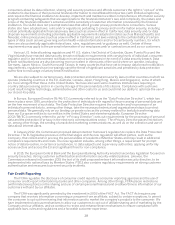American Express 2015 Annual Report Download - page 30
Download and view the complete annual report
Please find page 30 of the 2015 American Express annual report below. You can navigate through the pages in the report by either clicking on the pages listed below, or by using the keyword search tool below to find specific information within the annual report.
Netherlands and Spain permitting it and other countries such as France, Italy and Sweden prohibiting it. All Member
States permit merchants to offer discounts for particular forms of payment.
The PSD has complemented another European initiative, the Single Euro Payments Area (“SEPA”), which is an
industry-led initiative with support from EU institutions. Among other changes, SEPA has involved the adoption of new,
pan-European technical standards for card transactions and the introduction of new direct debit and credit transfer
systems, which we can use for collecting and initiating payments with Card Members, merchants and other
counterparties. Compliance with the PSD, SEPA and related requirements has involved significant costs to implement
and maintain. In addition, the Consumer Rights Directive (“CRD”) prohibits merchants from surcharging card
purchases more than the merchants’ cost of acceptance in those Member States that permit surcharging pursuant to
the PSD. The CRD provides no guidance to merchants on how to assess the cost of acceptance or take into account
the relative value of different payment methods. A cost-based limit on surcharging could result in merchants imposing
higher surcharges on American Express transactions if, in the absence of clear guidance, a surcharging merchant took
the position that the cost of American Express acceptance is higher than other payment cards. These elements of the
CRD may be superseded by proposals now under consideration as part of the EU Payments Package discussed above.
In July 2013, the European Commission (the “Commission”) proposed legislation in two parts, covering a wide
range of topics across the payments industry. The first part was a proposed EU-wide regulation on interchange fees
(the “Interchange Fee Regulation”); the second consisted of revisions to the PSD (the “PSD2”).
The Interchange Fee Regulation was formally adopted in April 2015. The substantive terms as adopted include the
following:
• Price caps — Interchange fees on consumer card transactions in the EU are capped as of December 2015,
generally at 20 basis points for debit and prepaid cards and 30 basis points for credit and charge cards, with the
possibility of lower caps in some instances. Although we do not have interchange fees and “three-party”
networks such as American Express are exempt from the application of the caps, the regulation provides that
“three-party” networks should be treated as “four-party” networks (such as Visa and MasterCard, which have
interchange fees) when they license third-party providers to issue cards and/or acquire merchants or when
they issue cards with a cobrand partner or through an agent. This means, for example, the caps will apply to
elements of the financial arrangements agreed to between us and each of our GNS partners in the EU, which
may undermine our ability to attract and retain GNS partners. While the discount rates we agree to with
merchants are not capped, the interchange caps have exerted, and will likely continue to exert, downward
pressures on merchant fees across the industry, including our discount rates. The Interchange Fee Regulation
excludes commercial card transactions from the scope of the caps.
• Card acceptance terms —“Anti-steering” and honor-all-cards rules across all card networks, including non-
discrimination and honor-all-cards provisions in our card acceptance agreements, are prohibited with some
exceptions. Removal of these provisions creates significant risk of customer confusion and Card Member
dissatisfaction, which would result in harm to the American Express brand. The prohibition on “anti-steering
rules” took effect immediately upon effectiveness of the regulation; the prohibition on honor-all-cards rules
takes effect in June 2016.
• Network licensing — In December 2015, the geographic scope of network licenses within the EU, including those
we agree to with our GNS partners, was amended to cover the entire EU. This allows GNS partners to actively
pursue their American Express business throughout the EU, including countries where we or other GNS
partners are present, and may undermine the value of licenses granted to some GNS partners to date, which
have been subject to varying levels of exclusivity to incentivize development of the American Express business
in relation to a particular country.
• Separation of network processing — From June 2016, card networks will be required to separate their network
processing functions (in which transactions between different issuers and acquirers are processed for
authorization, clearing and settlement). This provision does not generally apply to “three-party” payment
networks, such as American Express, but may be deemed applicable, for example, where a different GNS issuer
and acquirer is involved in a transaction, which represent a very small percentage of transactions on our
network.
• Co-badging of cards — From June 2016, a single card may bear the brand of multiple networks and be used to
process transactions on any of those networks. Merchants may install automatic mechanisms in point-of-sale
equipment to prioritize selection of a particular network, subject to override by the cardholder. These provisions
may harm the American Express brand insofar as GNS issuing partners will be able to offer multiple networks on
a single card and merchants may program their point-of-sale equipment to prioritize selection of another
network on such cards.
The PSD2 was adopted on November 25, 2015, and was published in the Official Journal of the EU on
December 23, 2015. Each Member State has until January 2018 to transpose the PSD2 into national law.
Among other terms, the published text of PSD2 includes provisions that will (i) further regulate surcharging so that
transactions falling in scope of the interchange caps could not be surcharged, but transactions falling outside the scope of
19
























